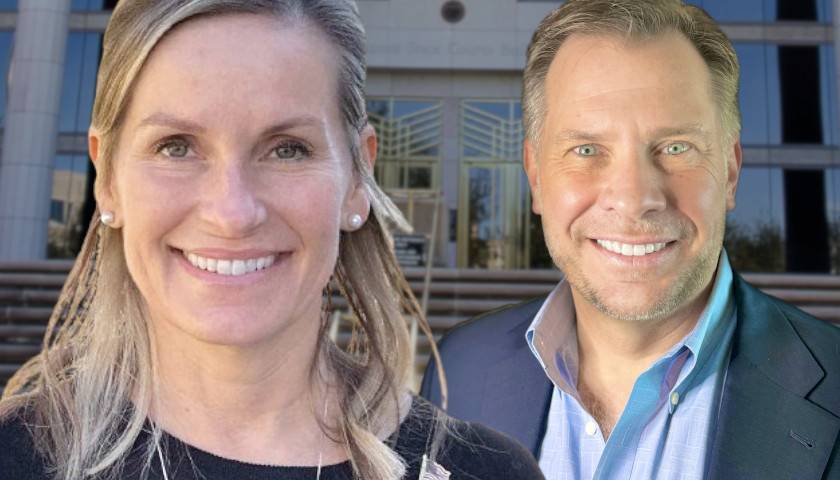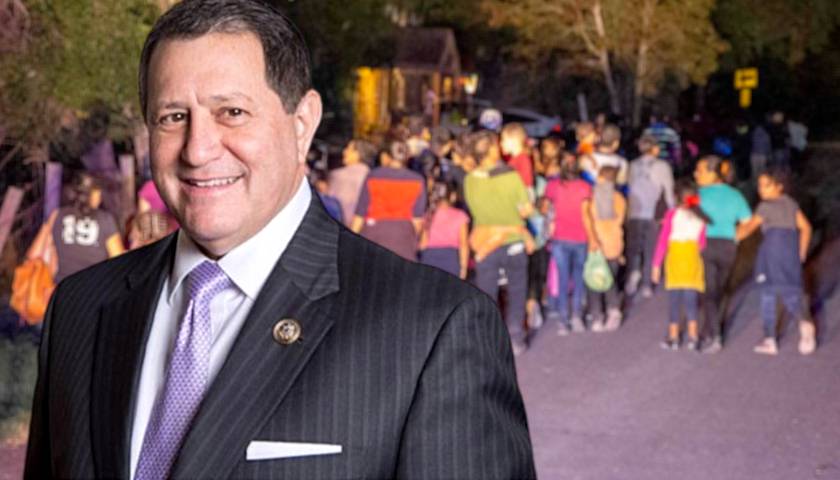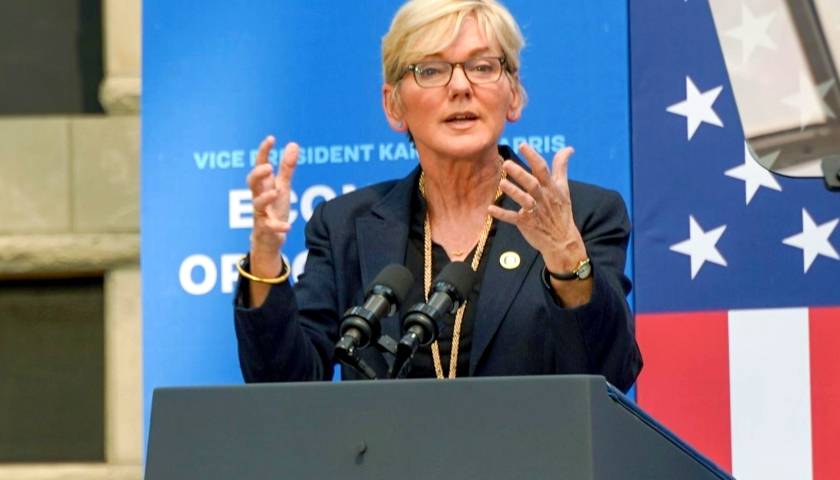The Arizona Supreme Court upheld the trial court’s decision allowing Congressional District 1 (CD1) candidate Kim George to remain on the ballot later Wednesday, despite a challenge from businessman Robert Backie.
George told The Arizona Sun Times, “I’m appreciative the Supreme Court affirmed the lower court’s ruling and am ready to focus on winning this election.”
The congressional candidate added that although she is disappointed by Backie’s “lawfare,” she said that she and the other self-described America-First candidates “won’t back down to bully tactics.”
“Lawfare” – a play on the word “warfare” – refers to the use of legal mechanisms and processes as a tool to achieve objectives, often political in nature. The blog LawfareMedia.org credits the term to then-Air Force Colonel Charles Dunlap, who they say first used the term in a 2001 paper ‘Law and Military Interventions: Reserving Humanitarian Values in 21st Century Conflicts.’ In practice, lawfare encompasses tactics such as frivolous lawsuits, strategic litigation, or exploiting legal ambiguities to undermine opponents or advance specific agendas.
On April 15, Backie (pictured above, right) filed a petition challenging George’s candidacy. The lower court had previously ruled in favor of George (pictured above, left), describing Backie’s challenge as based on a “novel legal theory.” The state Supreme Court clarified in its ruling that the statute, rather than the Election Procedure Manual (EPM), should be controlling in instances of conflict. Backie and George are the challengers who seek to unseat Representative David Schweikert (R-AZ-1).
In Backie v George, the parties agreed on the material facts:
Under A.R.S. § 16-322(A)(2), the minimum number of valid signatures required for the Republican Party nomination for the office of U.S. Representative for CD1 is 1,742. On April 19, 2024, the Maricopa County Recorder’s Office issued its Petition Verification Report, which reviewed 398 signatures challenged in the complaint. The parties acknowledged that the Recorder disqualified 249 petition signers, deeming them unqualified when they signed George’s nomination petitions.
According to the Joint Pretrial Statement, George submitted 2,807 signatures, well above the statutory requirement, even after 249 signatures were disqualified.
Circulator Issue a/k/a “Novel Legal Theory”
The Arizona Secretary of State is responsible for drafting and publishing the EPM, which contains rules for Arizona election procedures, including regulations for petition circulators. The EPM mandates that circulators must register through an electronic portal, and their registration isn’t complete until confirmed in writing by the secretary of state.
Backie challenged the signatures that George’s circulators had collected, focusing on whether to disqualify signatures based on the date a circulator added a candidate to the Circulator Portal rather than the official registration date the EPM stipulated.
Despite the plaintiff’s arguments to disqualify over 1,000 signatures on this basis, the defendants maintained that all circulators substantially complied with the registration requirements. George argued that no statutory basis existed to invalidate signatures based on the timing of selecting a specific candidate in the portal, asserting the validity of the challenged signatures. In her pleadings, George claimed she gathered enough valid signatures to qualify for the ballot in the upcoming primary election for U.S. representative for CD1. The trial court agreed with this perspective and labeled the circulator argument as a “novel legal theory.”
This “novel legal theory” also surfaced at the same time in the case of Breckling v. Hernandez, where the Elias Law Group represented the plaintiff challenging the Green Party candidate in the CD1 race. This case closely mirrored the issues in George’s situation and was dismissed by the same court for similar legal reasons.
George accused her primary opponent, Backie, of collaborating with Marc Elias, whom she labeled a “Democrat hatchet man.” In response, Backie told The Sun Times that this allegation was “completely false and dishonest.” He further stated that he has joined forces with CD1 voters fed up with dishonest politicians who will say anything to get elected.
Well, here we go again…Just when you thought law fare was only from the Democrats, it’s now from within the Republican party.
Please go to https://t.co/ARknJ2ZrWY to help me fight back! pic.twitter.com/BrIyAW0XKI
— Kim George for Arizona (@KimGeorgeForAZ) April 30, 2024
The Court Rulings
The lower court ruled in favor of George, determining that Backie did not prove that the signatures collected were invalid. According to Arizona law, non-resident circulators are not required to complete registration before circulating petitions; they only need to obtain a Circulator ID from the electronic Circulator Portal. The court found that this satisfies the statutory requirements for registration, allowing for adequate scrutiny of circulator qualifications.
However, the court invalidated 61 signatures collected by one of the circulators for failing to meet registration deadlines, but George still surpassed the necessary minimum with 2,497 valid signatures, thus qualifying her for the ballot. The court emphasized that legislative intent, focusing on the primary purpose of the rules rather than procedural details, should guide the interpretation of these requirements.
The state Supreme Court concurred with the lower court’s decision, citing the precedent set by Breckling v. Hernandez, which was decided on similar grounds. Arizona’s highest court held, “EPM’s creation of a de-registration process for ballot measure circulators could not affect the circulators’ statutory responsibilities or the legal sufficiency of underlying signatures.” Therefore, it affirmed the trial court’s verdict.
The Primary Republican Candidates in CD1
Schweikert is currently serving his seventh term as the representative for Arizona’s 1st Congressional District. He has a background in state and federal politics, including roles such as the Arizona State Board of Equalization Chair and Maricopa County Treasurer. In Congress, he notably works on the Ways and Means Committee, focusing on tax reform and healthcare, and his website, says he made significant contributions to the Tax Cuts and Jobs Act. He has also championed the expansion of telehealth during the COVID-19 pandemic. In 2020 and 2022, Schweikert faced criticism for ethical and financial misconduct.
Backie, says on his website that he is the son of a pastor. He says he aims to bring integrity, hard work, and honesty back to the district. Backie argues that the district deserves representation by a businessman focused on improving lives rather than enriching himself. He notes that he brings extensive business experience to his first political campaign, with over three decades of leadership in semiconductors, the internet, telecom, cybersecurity, and healthcare sectors.
George describes herself on her website as a true American First Patriot and is passionate about truth, integrity, and the rule of law. She is campaigning on themes of restoring the American Dream and advocating for strong leadership that prioritizes the interests of Arizonans. George has a 23-year career as an FBI Special Agent and roles in global security and insider risk management post-FBI. She focuses her campaign on national security, border security, reforming intelligence agencies, combating corruption in the justice system, and economic measures such as controlling inflation and reducing taxes. George advocates for “America First” policies and emphasizes the need for leaders with real-life experience over bureaucrats.
Arizona’s primary election day is July 30, and the deadline to register to vote is July 1st.
– – –
Christy Kelly is a reporter at The Arizona Sun Times and The Star News Network. Follow Christy on Twitter / X. Email tips to [email protected].
Photo “Kim George” by Kim George. Photo “Robert Backie” by Robert Backie. Background Photo “Arizona Supreme Court” by davidpinter. CC BY 3.0.





